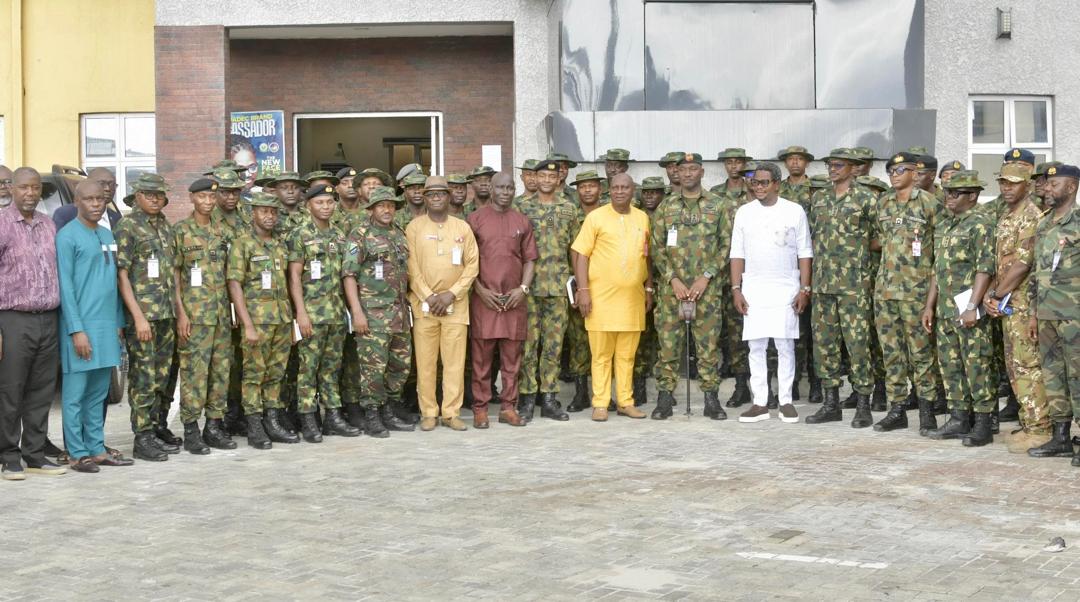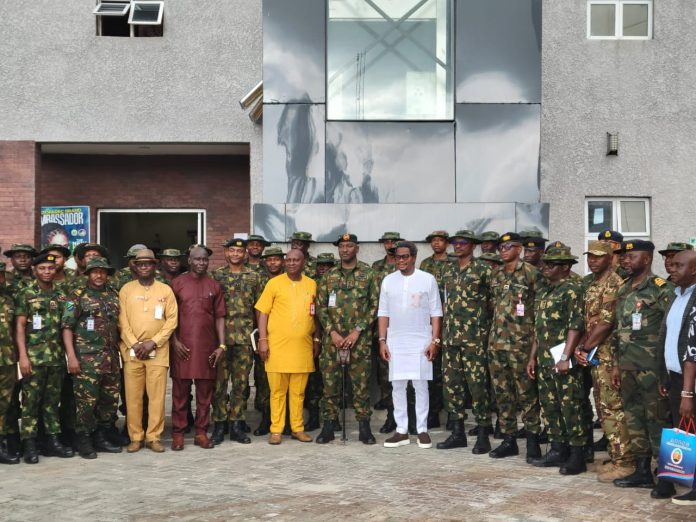By Elohor Foghola /Elizabeth Oduje
The Managing Director of the Delta State Oil Producing Areas Development Commission (DESOPADEC), Chief Festus Ochonogor, has stated that lasting peace and security in the Niger Delta can only be achieved through inclusive development and meaningful engagement with grassroots communities.
Chief Ochonogor made this known while receiving participants of Senior Course 47 of the Armed Forces Command and Staff College, Jaji, led by the Director of Coordination, Brigadier General Al-Hassan Grema, during a courtesy visit to DESOPADEC cooperate head office in Warri, on today.

Chief Ochonogor who was represented by the Executive Director of Projects, Chief Dr. Ebenezer Okorodudu said “Your visit is not only timely but strategic,” Dr. Okorodudu stated. “There’s no discussion about national security in the Niger Delta that can be complete without referencing Delta State. And in Delta, DESOPADEC remains the cornerstone of stability through development.”
The MD gave an overview of the Commission’s role in driving development in the state’s 21 oil-producing local government areas, explaining how decades of neglect and marginalization led to agitation and restiveness in the region.
“DESOPADEC was created in 2007 to manage 50% of the 13% oil derivation fund coming to Delta State, with a clear mandate to develop communities long neglected despite contributing immensely to the nation’s wealth,” he said.
Since then, we have been implementing life-changing projects—roads, housing, electrification, water, education, and youth empowerment—all aimed at reducing the root causes of insecurity,”.
He emphasized that beyond infrastructure, the Commission plays a pivotal role in community engagement, especially with restive youth groups across its mandate area
“DESOPADEC is not just a development agency. It is also a peace-building agency. We interface regularly with youths across the ethnic nationalities to address grievances and sustain community harmony,” Ochonogor noted.
“The more you provide for the people, the more they appreciate government’s presence and the more you reduce insecurity,” he said. “We directly interface with the communities, not through a proxy.”
He assured the delegation of continued cooperation and noted that DESOPADEC maintains a comprehensive database of all its projects, making access to verified development records possible within minutes.
He also presented a detailed report on the Commission’s projects of the previous board to the participants.
Earlier in his remark, Brigadier General Grema, Director of Coordination at the Armed Forces Command and Staff College and leader of Team 7 on the Nigerian Study Tour, expressed gratitude to DESOPADEC for the warm reception, noting that their visit to Delta State was both strategic and intentional.
“Delta is one of the key states in the Niger Delta where security cannot be effectively maintained without deep intelligence gathering at the grassroots level,” he said. “That is why we deliberately chose to come here—to understand how institutions like DESOPADEC contribute to peace and stability.”
He explained that the Nigerian Study Tour is an annual exercise aimed at preparing mid-level officers from the Army, Navy, and Air Force for senior leadership roles through in-depth engagement with real-world security dynamics.
This year’s theme, Harnessing Grassroots Intelligence for Enhanced Internal Security Operations, reflects the military’s recognition of the vital role communities play in shaping internal security outcomes.
According to General Grema, the Armed Forces delegation was eager to learn how DESOPADEC accesses, processes, and applies grassroots intelligence to inform development decisions that have a direct impact on security.
“We are here to ask: How are you getting your intelligence? How is it used? Is it more effective than formal channels? And how can we replicate this model elsewhere?” he asked. He further emphasized the value of firsthand engagement, saying it provided insights beyond what official documents could convey.
He also noted that their team was visiting nine states simultaneously, with each submitting a report and recommendations at the end of the exercise.

“We hope to integrate what we’ve learned here into our national findings. What you are doing at DESOPADEC—linking infrastructure, youth engagement, and data-driven planning—is something we believe can inform national security policy,” Bremer added.
Highpoint of the visit was presentation of a commemorative plaque to the managing director of DESOPADEC by Brigadier General Grema


